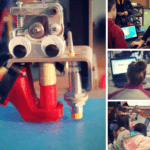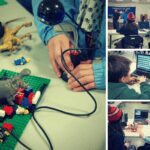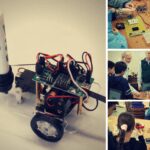My library held an all-day STEAM (STEM + Art) event on a recent Saturday. It was great to see tweens and teens taking technology, engineering, and art classes, and having the opportunity to explore, create, and learn with local area educators. I wanted to share this experience so that you might be inspired to ask your local library to host a similar event.

Many libraries are at the forefront of STEM programming and have their own 3D printers, host makerspaces, and hold computer programming and robotics classes. In fact, earlier this month, libraries around the country participated in Teen Tech WeekTM, many of which held creative tech-oriented classes for their teen patrons. With so much interest for tech programming, librarians are eager to offer STEM classes that help their young patrons explore and learn about technology.
My library is a great supporter of STEM education and has been holding classes and activities regularly over the past year including Makey Makey and Scratch programming. I got the idea for holding an all-day STEM-focused event when my daughter attended the Spark weekend at MIT last year. At Spark, kids get to take a lot of short classes on a wide variety of topics of their choosing. It’s a great model because it exposes kids to subjects they may not have considered before.
I approached my library with the idea of an all-day event and the librarians were on board. They liked the idea of expanding their STEM programming and reaching more students. Cynthia Mitchem, the Teen librarian, summed it up well when she told me “the earlier a person can get involved in STEAM, the better.” She also added that “not all parents can afford to send their children to fantastic but expensive extra-curricular classes. A library is a place of information and that extends to our programs.”

I worked with the Teen and Tech librarians to develop a mix of hands-on classes. We used a blend of local area companies along with a middle school art teacher and a high school student with computer programming skills. Here’s what we offered:
1) Introduction to 3D printing with Einstein’s Workshop
2) Learn about basic circuits and how to build a simple robot with the Rhode Island Computer Museum
3) Learn the fundamentals of object-oriented programming in a Gamemaker Workshop with Empow Studios
4) Learn about the innovative field of soft robotics with Christina Nicolson
5) Design a non-electronic, self-operating machine using paper with middle school art teacher, Kristen Ripley
6) Learn the science and art of stop-motion animation with Empow Studios
7) Hear from a high school student who learned computer programming and designed his own apps for iOS and Android
Going into the event, the interest was overwhelming. Students had to register for the classes and the programs filled up in just two days. The event day was a huge success, and it was great to see kids everywhere in the library programming, building, creating, learning and having fun.
I asked Cynthia, the Teen Librarian, for her thoughts on the day and she said, “It went well! We managed to hold a full day of youth STEAM programs that were well-attended and diverse. We had some great presenters, and I’m particularly happy that we had a large turnout of young women at the programs- it’s always good to see just how wrong stereotypes and gender biases are.”

How do you get your library to hold STEAM programs for kids?
Start by talking with your children’s and teen librarians. You may also want to speak with your tech librarian and director too. Let them know you’re interested in STEAM education and give them ideas for classes your kids and their friends might like to take. Computer programming and robotics classes are very popular among kids.
If your library isn’t ready for an all-day affair, ask them if they can start with a class or two. Librarians are accustomed to designing new programs and have a lot of resources available to them through the American Library Association.
My kids have had a great experience taking tech classes through our library. Libraries are such a benefit to our communities, and by offering tech-focused classes, library programs complement what kids learn in school and in other out-of-school programs.
Image Sources: Courtesy of the Belmont Public Library







